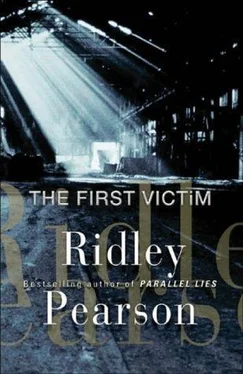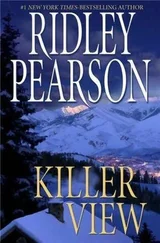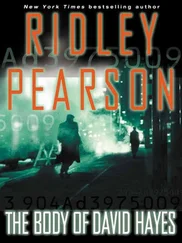Ridley Pearson - The First Victim
Здесь есть возможность читать онлайн «Ridley Pearson - The First Victim» весь текст электронной книги совершенно бесплатно (целиком полную версию без сокращений). В некоторых случаях можно слушать аудио, скачать через торрент в формате fb2 и присутствует краткое содержание. Жанр: Триллер, на английском языке. Описание произведения, (предисловие) а так же отзывы посетителей доступны на портале библиотеки ЛибКат.
- Название:The First Victim
- Автор:
- Жанр:
- Год:неизвестен
- ISBN:нет данных
- Рейтинг книги:3 / 5. Голосов: 1
-
Избранное:Добавить в избранное
- Отзывы:
-
Ваша оценка:
- 60
- 1
- 2
- 3
- 4
- 5
The First Victim: краткое содержание, описание и аннотация
Предлагаем к чтению аннотацию, описание, краткое содержание или предисловие (зависит от того, что написал сам автор книги «The First Victim»). Если вы не нашли необходимую информацию о книге — напишите в комментариях, мы постараемся отыскать её.
The First Victim — читать онлайн бесплатно полную книгу (весь текст) целиком
Ниже представлен текст книги, разбитый по страницам. Система сохранения места последней прочитанной страницы, позволяет с удобством читать онлайн бесплатно книгу «The First Victim», без необходимости каждый раз заново искать на чём Вы остановились. Поставьте закладку, и сможете в любой момент перейти на страницу, на которой закончили чтение.
Интервал:
Закладка:
‘‘Law does not have eyes. Law is blind. Law does not see parents, only children.’’ She swept her pudgy hand across the room.
‘‘Lady Justice is blind,’’ Boldt corrected.
She squinted up at him like a person looking into the sun. ‘‘Why you make so much trouble?’’
‘‘These people did nothing to help these women when they became sick. You don’t need laws to tell you that is a crime! If one of these children became sick with the flu, would you simply allow the child to die?’’
‘‘You not sure of this,’’ she tested.
‘‘Oh yes, we’re sure.’’ He leaned in closely to her and whispered faintly. ‘‘The woman in the graveyard-buried without a casket, without a service, dumped into the mud-had been violently raped.’’ He added reluctantly, ‘‘Every cavity.’’
This news clearly struck her. Red-hot anger flashed behind her dark eyes.
‘‘Starved to death, raped and buried,’’ Boldt repeated before leaning farther away. ‘‘They froze her body-we’re not sure for how long, or why. We know she was a part of a sweatshop. Her fingers. .’’
Mama Lu stood, leaning on the cane in stunned silence, the gleeful sounds of children swirling about them.
‘‘A sweatshop could not operate in this city without your knowledge,’’ Boldt said boldly. ‘‘I’m not suggesting your participation, only your awareness.’’ He added, ‘‘Can you continue to condone such behavior? Help me stop them, Great Lady. You will be a hero, a great friend to this city.’’
‘‘People arrive from overseas,’’ she said, equally softly. ‘‘They have no place find work. Government no allow them work. Much need this work, Mr. Both. What to do? Make lady favors? This kind of work? Die of disease? This not fair. Very much not fair.’’
‘‘They starved her and they raped her.’’ Boldt was struck by the severity of their discussion, especially when contrasted to the gleeful enthusiasm that surrounded them. ‘‘This is fair?’’
‘‘Horrible,’’ the lady gasped. ‘‘Your visit much appreciated.’’
‘‘No, no, no!’’ Boldt corrected. ‘‘We believe this sweatshop is in a cannery-an old cannery perhaps. We have evidence to support this.’’
‘‘Many canneries, once upon a time. Big city. Big area.’’
‘‘Exactly,’’ he said. ‘‘Help me, Great Lady. We find the sweatshop, we stop looking,’’ he suggested. This won her attention. He nodded his insistence. ‘‘If we don’t find the right sweatshop, we’re going to be conducting a lot of raids. Bottom line: The people who did this are going down for it.’’
‘‘And these children?’’ she asked. ‘‘Their mothers once made the clothing you speak of. This is how they survived. What of them?’’
‘‘Four women are dead. Medical Examiner says three had given birth. Their children have no mothers. Is that what you want?’’
‘‘You have two children,’’ she said, surprising Boldt with her knowledge. ‘‘One boy, Miles. Daughter, Sa-ra,’’ she mispronounced. ‘‘You love your daughter, Mr. Both?’’
He didn’t answer. He glared at her, his heart racing, suddenly wishing he’d never met her. He swallowed hard, recalling the time Sarah had been kidnapped. He understood that hell firsthand; he relived it almost every night, the unspoken source of his insomnia.
‘‘You see child?’’ she asked, pointing out a small girl no older than two. ‘‘Her mother give birth this child, yes? In China-one child only. If boy, he grow up, keep family home, take care parents. Girl moves away with husband. Girl child no good. Many daughters born, but left in street, never seen again. Yes?’’
Boldt could think only of Sarah and Miles. Why had she mentioned them? How had she known?
‘‘Many daughter sent to cousins in America. Here, Seattle. Yes? Mother pay much money for this. Mother come later, in bottom of ship. In container. Yes? American government say she not political refugee, has no right live in America. You, Mr. Both? You refuse her chance to be with own daughter? She work hard many years, no papers. Earn much money. Find green card. Citizen now.’’ She added with a faint smile, ‘‘This America. Everything for sale.’’
Boldt held his tongue, still thinking about Sarah and the idea of daughters abandoned at birth, or shipped away to a distant land. He felt cold. Sick to his stomach.
‘‘We don’t know her name,’’ he finally said. ‘‘The woman we found in the grave. Raped, starved. No name. She won’t be buying her freedom. She won’t be buying anything.’’ He tried once again to get his point across. ‘‘There are people who say there’s no way a sweatshop can operate in this city without your knowledge.’’
She craned forward ominously. ‘‘You believe such things?’’
‘‘A woman is missing. I must find her. I must stop these people who treat these women this way. It’s going to stop, Great Lady, with or without you. I would be most grateful for any guidance you could give me in where to look for this sweatshop. Believe me, no one need ever know my source for such information.’’
‘‘Leave this alone, Mr. Both,’’ she said. ‘‘This dangerous, everyone involved. Yourself too. You help me very much coming here, tell me these things.’’
‘‘I didn’t come here to help you. I came here to ask you to help me.’’
She pointed to the door. ‘‘Of course I help you. No problem. But you must listen, yes? This woman who make the news on the TV, she make wrong people mad. Your name too get mentioned. You make her listen-no make so much trouble. Bad for everyone.’’ She warned ominously, ‘‘You watch for shadows, Mr. Both-shadows not cast by you. Wrong people make mad.’’
Boldt felt his throat go dry as he restated, ‘‘Our evidence is growing. We will find the people responsible. We will put them out of business.’’ He caught himself reducing his sentences to clipped English, pandering to her in ways he did with few others. For all he knew she spoke fluent English. ‘‘They, and anyone associated with them, are going to prison.’’
She said, ‘‘Go home your children, your wife, Mr. Both.’’
‘‘It doesn’t work like that,’’ Boldt objected. ‘‘Lady Justice may be blind, Great Lady. The police are not. We are the law, no one else. Not you, not anyone else.’’
‘‘We both idealists. Yes?’’ When she grinned her dentures showed, as perfect as a picket fence. Those teeth didn’t belong in such a face. They robbed her of character. ‘‘Too bad for both of us.’’
CHAPTER 36
Boldt waited ten minutes outside the offices of Boeing’s vice president of human resources, alone with his battered briefcase, his ten-year-old suit and a stomach churning with raw nerves. He was always in the role of the one doing the questioning, never the object of it. The idea of some corporate executive, with a title so long that it couldn’t possibly fit on a business card, quizzing him about his life, his family, his dreams, struck him as deeply disturbing. How did he explain that he didn’t want the job, only that he needed the added income? How did he explain that if Sheila Hill confined him to a desk, he’d just as soon the desk be across town for twice the pay? That sitting at that desk while others were at the game was a cruel form of torture? How did he tell another human being that in a way not morbid at all, he lived for the fieldwork, the dead bodies, if only because they kept his mind alive, his imagination active, and his raison d’etre intact?
The thick glass of the coffee table was littered with aviation and golf magazines. Across the fairly antiseptic reception room, a matronly secretary stayed busy at her phone and computer, though she didn’t appear too absorbed by the work, finding enough time to repeatedly sneak glimpses of Boldt and his nervous demeanor. He brushed the shoulders of the dark suit clean, inspected the hang of his tie. His hand darted into his crotch quickly to ensure his fly was up; the secretary caught that movement and taking it for a signal, lifted her head slightly, peered above a set of half glasses and said, ‘‘Shouldn’t be much longer.’’
Читать дальшеИнтервал:
Закладка:
Похожие книги на «The First Victim»
Представляем Вашему вниманию похожие книги на «The First Victim» списком для выбора. Мы отобрали схожую по названию и смыслу литературу в надежде предоставить читателям больше вариантов отыскать новые, интересные, ещё непрочитанные произведения.
Обсуждение, отзывы о книге «The First Victim» и просто собственные мнения читателей. Оставьте ваши комментарии, напишите, что Вы думаете о произведении, его смысле или главных героях. Укажите что конкретно понравилось, а что нет, и почему Вы так считаете.












